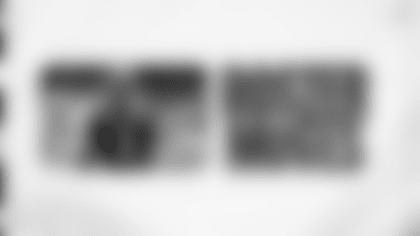Remember that celebrated and precedent-setting expansion of replay review covering pass interference the NFL approved for the upcoming season at the league's annual meeting in Phoenix in late March? Believe it or not it's already contracting, not even two months after its passage.
Moving to potentially fix something before anyone could even know if its broken yet, the NFL on Wednesday decided upon further review it doesn't want the replay expansion it thought it wanted. At least possibly.
That's the crux of what just occurred at the NFL's one-day spring owners meeting in Key Biscayne, Fla., where the owners passed a resolution to give the league's rules-making competition committee the leeway to "tweak'' the new replay review of pass interference before the 2019 season starts, if it deems it necessary. And you can safely bet it'll be deemed necessary.
What changed, and why so soon? Fair questions for a deliberative body that gave us the hastily approved and confusing, poorly rolled-out rule changes regarding helmet contact and roughing-the-passer last season. The competition committee is back at it again this year, first downplaying the need for any expansion of replay review in light of the grievous missed pass interference call toward the end of the Rams-Saints NFC title game, and then quickly changing course and ramming through a major rules change once the coaches and clubs showed widespread support for expanded replay review to address pass interference.
Gone, or soon to be gone, will be the tenet that pass interference replay review will work like the review system works the rest of the game: Coaches can challenge a call (or non-call, in this case) in the first 28 minutes of each half, while the decision to review any interference call (or non-call) in the final two minutes of each half belongs under purview of the replay assistant in the booth.
The competition committee at some point in the past eight weeks became convinced that too many pass interference reviews could occur in the final two minutes of each half if left to the jurisdiction of the replay assistant, so it will now likely change the rule so that all pass interference determinations will occur via the coaches' challenge system.
The result of that "tweak'' is quite substantial: Coaches better save at least one challenge, and one timeout, in the event the officials blow an obvious, game-changing (and who knows, maybe Super Bowl-berth deciding) pass interference call in the final two minutes of a game. Otherwise they're out of luck, the same way the Saints were in January at the Superdome, with no recourse for the replay official to right an obvious wrong in real time and avoid a weeks-long firestorm of public outcry.
The league is preparing to put the onus back squarely on the coaches, rather than rely on the uniformity of judgment of its own replay assistants in the booth. And it's all in the name of not slowing down the game too much, rather than making the pursuit of the correct call the ultimate goal.
Why is the NFL so afraid of getting it right, and testing out its own rules changes? The league in March actually went with the replay assistant review of pass interference in the final two minutes to avoid coaches saving a challenge to protest too many Hail Mary plays at the end of each half, when officials routinely look the other way and allow plenty of incidental contact between receivers and defenders. The competition committee didn't want the coaches to turn that last-gasp desperation play into farce, challenging everything in sight. But with a limited number of challenges to begin with — two per game per team, three if both challenges are successful — in reality that was never going to happen.
So now the committee plans to alter the replay review rules to exempt Hail Mary plays altogether from being reviewed by replay for pass interference. First off, that all but acknowledges that pass interference takes place and is basically allowed on most Hail Marys — unless it's the most blatant example — and secondly, good luck with coming up with a uniform and agreed upon definition of what exactly constitutes a Hail Mary play. Whatever the committee codifies as a definition — four receivers in the end zone, five? — smart coaches will then set up finding a loophole to exploit so that the play isn't technically a Hail Mary and can fall under the replay review challenge system.
If you think you're confused, wait until the game officials get a load of some unnamed coach (maybe the one in Foxboro?) who saves a challenge and a timeout, then runs a non-Hail Mary by definition that looks all the world like a Hail Mary, challenging the contact he sees as a missed pass interference call. Their first job will be to determine if the play was a Hail Mail by definition, thereby exempting it from a challenge and replay review, and if not, then they'll have to go to the booth to rule on the pass interference issue.
You want to talk about lengthy stoppages and delays to the game in the final two minutes? You ain't seen nothing yet. Crack a cold one and settle in.
Which is why the NFL probably over-reacted with Wednesday's move to limit the scope of the new replay review rules pertaining to pass interference. The league passed the new rules as a one-year experiment for 2019 only, then couldn't even wait to see if any issues emerged once the games began and the system was in place. It's anticipating the flaws of the new rules, rather than experiencing them. That's how you get solutions in search of a problem, rather than the other way around.
The competition committee plans to conduct meetings and conference calls with coaches in the coming weeks, with the goal of formally changing and clarifying the "new" new rules before 2019 training camps begin to open.
But the bottom line is that the expansion of replay review for pass interference calls and non-calls will be anything but far-reaching, especially now. Not with coaches having the sole responsibility to identify and challenge potential mistakes, rather than also having the assistance of the replay assistant in the final two minutes.
And that means we likely haven't seen the last of the kind of officiating debacle that decided the Rams-Saints game, new rules or no new rules. And wasn't that the point all along, trying to avoid having to swallow and live with a game-deciding late error that could have been correctable? That possibility clearly remains.
Replay review aside, the NFL, at least in my view got a couple things right on Wednesday in Key Biscayne. Sensing nowhere near enough support for it once again, the league declined to vote on Kansas City's proposal to give both teams at least one possession in overtime, even if the first team scores a touchdown. Tabled at the March annual meeting, the Chiefs' proposal was expected to be re-submitted as a postseason-only rule change. But it apparently still didn't generate a substantial groundswell of backing, perhaps because many teams seem less than enthusiastic about having one set of rules for the regular season and another for the playoffs.
Repeat after me: Defense is half the game. Play some and you too can win in overtime, the way the Rams did against New Orleans in the NFC Championship game. Look it up.
And lastly, we bid the Oklahoma drill a less-than-fond farewell. The NFL decided to formally bar teams from conducting such high-contact and often dangerous drills in training camp in its attempt to make the game safer from concussions and brain trauma. There are some parts of the game that retain their old-school charm, but the Oklahoma drill was not one of them. It will not be missed.

































